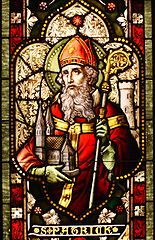
The Life And Writings Of Saint Patrick -Saint Patrick
III.—THE GREAT ST. PATRICK
ST. PATRICK appears greatest, where he is humblest, in his own Confession. No competent Irish scholar has ever ventured to question the authenticity of this work, because it bears on all things the stamp of its own genuineness. It never could in any hypothesis be conceived as the work of a forger or impostor, because its author was manifestly a saint like Paul. Now, throughout the Confession, the Saint, though speaking like St. Paul in self-defence and with the utmost humility, represents the conversion of Ireland as his own work through the goodness and mercy of God. “I am,” he says, “greatly the debtor of God, who has given to me this great grace, that through me many peoples should be born again unto God, and that clerics should be everywhere ordained for them—a nation lately coming to the faith whom God has raised up at the very ends of the earth.” And a little further on he describes the Irish as a people who never before had any knowledge of God, and up to that time had always worshipped idols and unclean things, but now are become the people of the Lord, and sons of God—nay, the sons of the Scots and the daughters of their kings are seen to become monks and virgins of Christ. In these passages, therefore, the Apostle describes the entire conversion of the Irish nation as his own work through the grace of God.
And again he describes how he spent himself in their service.—‘Amongst you I went everywhere for your sake, in many dangers, even to the uttermost parts, beyond which no one dwells, and where no one had ever come to baptise or ordain clerics, or confirm the people, but through the gift of God, diligently and willingly for your salvation I have regenerated all.’ And therefore he prays so earnestly that it may never happen that he should lose any of those souls whom he had won for God at the end of the world. Whoever admits the authenticity of the Confession must also admit that there was only one Patrick, who, by the special grace and calling of God, converted the Irish nation.
And it was always the conviction of the Irish nation testified throughout all their history, that there was one and only one Patrick to whom they owed their conversion, and whom they have always loved with a passionate yearning love. Such love does not take a historical shadow for its object; it is born of a living reality, and can only grow up around a great historical figure brought into the most intimate relations with the whole nation. The pilgrimages to Armagh, to Croaghpatrick, to Lough Derg, of which all our history is full, testify to the historical individuality of our great father in Christ. The references in the Lives of our early saints and our national Annals tell the same story. The very wells—the holy wells in all parts of Ireland that bear the name of Patrick—would alone be sufficient to prove that there was one great saint who blessed them, who used them, who baptised the people in their limpid waters, and whose name has ever since been kept in the memory of the people by annual pilgrimages to the fountains sanctified by his presence and his blessing.

 Keep Site Running
Keep Site Running